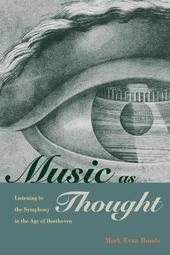
|
Music as Thought: Listening to the Symphony in the Age of Beethoven
Paperback / softback
Main Details
| Title |
Music as Thought: Listening to the Symphony in the Age of Beethoven
|
| Authors and Contributors |
By (author) Mark Evan Bonds
|
| Physical Properties |
| Format:Paperback / softback | | Pages:208 | | Dimensions(mm): Height 235,Width 152 |
|
| Category/Genre | Theory of music and musicology
Classical music (c 1750 to c 1830) |
|---|
| ISBN/Barcode |
9780691168050
|
| Classifications | Dewey:780.9034 |
|---|
| Audience | | Professional & Vocational | | Tertiary Education (US: College) | |
|---|
|
Publishing Details |
| Publisher |
Princeton University Press
|
| Imprint |
Princeton University Press
|
| Publication Date |
28 July 2015 |
| Publication Country |
United States
|
Description
Before the nineteenth century, instrumental music was considered inferior to vocal music. Kant described wordless music as "more pleasure than culture," and Rousseau dismissed it for its inability to convey concepts. But by the early 1800s, a dramatic shift was under way. Purely instrumental music was now being hailed as a means to knowledge and em
Author Biography
Mark Evan Bonds is Professor of Musicology at the University of North Carolina, Chapel Hill. His previous books include Wordless Rhetoric: Musical Form and the Metaphor of the Oration and After Beethoven: Imperatives of Originality in the Symphony. He is a former editor in chief of Beethoven Forum.
Reviews"A fascinating new book."--Alex Ross, The New Yorker "This is a cogent and well-illustrated account of the theoretical basis for the changes in how instrumental music was listened to in the early decades of the 19th century. Bonds clarifies complex material and piles up evidence to make a convincing case for a 'revolution in listening.'"--Patricia Howard, Currents "Philosophical discussion of music can easily become dense, but Bonds presents his arguments and evidence in a clear, discernible manner such that readers with little exposure to the philosophical issues of the time period can follow his reasoning and come away illuminated by a first-hand account concerning the reception of the symphony in the first quarter of the nineteenth century."--John Stine, Music Research Forum
|